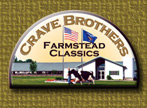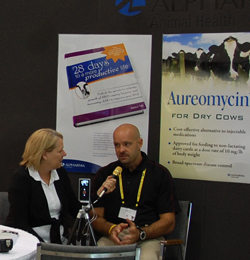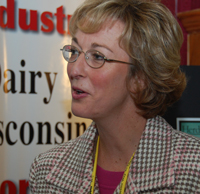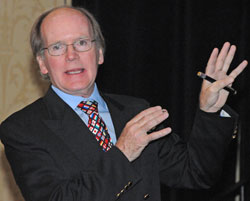 Dairy Markets Week in Review
Dairy Markets Week in Review
Cash dairy product prices keep strengthening. The block cheese price hit $1.5025 per pound the second Friday in October, up 6 3/4-cents on the week and the highest it has been since last December, but 37 3/4-cents below that week a year ago. Barrel closed Friday at $1.43, up a penny on the week, but 40 1/2-cents below a year ago. Only two cars of each traded hands on the week. The lagging NASS surveyed U.S. average block price slipped 0.3 cent, to $1.3106. Barrel averaged $1.3428, up 3.8 cents.
Butter gained a penny and then gave some back Friday, closing at $1.2375, up a quarter-cent on the week, but 46 1/2-cents below a year ago. Eight cars were sold. NASS butter averaged $1.2065, down 0.1 cent.
Cash Grade A nonfat dry milk closed the week at $1.28 per pound, up a dime on the week. Extra Grade closed at $1.22, up 7 cents. NASS powder averaged $1.0102, up 3.2 cents, and dry whey averaged 30.18 cents, down 0.1 cent.
There were no price support purchases on the week and the new fiscal year began October 1. DEIP bid acceptances this week included 3.3 million pounds of anhydrous milkfat, 176,368 pounds of Cheddar cheese, and 90,389 pounds of Mozzarella cheese.
Provided courtesy of Dairyline.

 Sign-up today for one of two days of four facility tours of Innovative calf and heifer operations, on Oct. 20 and 21. Developed by the
Sign-up today for one of two days of four facility tours of Innovative calf and heifer operations, on Oct. 20 and 21. Developed by the 
 Secretary of Agriculture Tom Vilsack, White House Council on Environmental Quality Chair Nancy Sutley, and Wisconsin Governor Jim Doyle will tour
Secretary of Agriculture Tom Vilsack, White House Council on Environmental Quality Chair Nancy Sutley, and Wisconsin Governor Jim Doyle will tour 



 At World Dairy Expo, I talked with Lance Fox of
At World Dairy Expo, I talked with Lance Fox of  While Wisconsin is in the name of the organization, Executive Director Shelly Mayer says they actually have grown into a network of 1,600 members from eleven states who represent every type and size of dairy operation. “We have producers that are members from Pennsylvania, the Dakotas, California, Arizona – all over the country – because they seek the information that PDPW is providing,” Shelly says.
While Wisconsin is in the name of the organization, Executive Director Shelly Mayer says they actually have grown into a network of 1,600 members from eleven states who represent every type and size of dairy operation. “We have producers that are members from Pennsylvania, the Dakotas, California, Arizona – all over the country – because they seek the information that PDPW is providing,” Shelly says. This November, the
This November, the  As a dairy producer, you are also a beef producer. Recently, the results of the
As a dairy producer, you are also a beef producer. Recently, the results of the  Wrapping up the Global Dairy 500 Conference was Dr. Pearse Lyons, Alltech President. Dr. Lyons summarized many of the presentations with a series of take home messages. The focus was on the future of dairy farming, the integration of a brand, methane production, cow comfort, tourist attractions, education, milk marketing with nutrition also being a key topic. Additionally, a strong message that came out of the presentations was to “record the data” and that body conditioning is critical. As Dr. Lyons said, “Talk to the cow and the cow will talk to you.”
Wrapping up the Global Dairy 500 Conference was Dr. Pearse Lyons, Alltech President. Dr. Lyons summarized many of the presentations with a series of take home messages. The focus was on the future of dairy farming, the integration of a brand, methane production, cow comfort, tourist attractions, education, milk marketing with nutrition also being a key topic. Additionally, a strong message that came out of the presentations was to “record the data” and that body conditioning is critical. As Dr. Lyons said, “Talk to the cow and the cow will talk to you.”